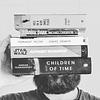Take a photo of a barcode or cover

booksnbeards 's review for:
Naoki Urasawa's 20th Century Boys, Vol. 1: Friends
by Naoki Urasawa
This serves as a review of the 20th Century Boys series as a whole, volumes 1-22, and including the epilogue series 21st Century Boys.
This is without a doubt the best manga I have ever read. More than that, it is one of the best pieces of fiction I've read in a very long time - a great (extremely extended) coming of age story.
20th Century Boys is the story of Kenji and his group of friends who, as children in the early 70's, had a secret club. They planned to save the world and be heroes - as such, they planned out what the evil organisation was going to do to destroy the world, so they could more properly prepare to save it.
Flash forward to 20 years later, and Kenji is running a convenience store and looking after his baby niece. Suddenly events start occurring which are strikingly similar to those which he and his friends chronicled in the Book of Prophecy as children. It's up to Kenji and his friends to save the Earth - for real.
I think my favourite part of 20th Century Boys is the narrative style. The story jumps back and forth haphazardly between 1970-71, the mid-late 90's, and even further on - in total, the series spans nearly 70 years, from 1960 all the way through to 2018. As Kenji and his friends remember different parts of the prophecy they made as children, the story flashes back to them as kids, coming up with all this stuff. It's a really unique way of telling it, and keeps you constantly engaged - whereas if there was simply a huge block of Kenji-and-crew-as-kids and then a huge block of grown-up-Kenji-and-crew, it would get dull.
It certainly isn't a series that is afraid of depth - dozens of things are set up far ahead of time, even things that are hinted at in Volume 1 and are only resolved in Volume 21 or 22. Plenty of red herrings - things that you think matter, but don't - and plenty of double-herrings (is that a thing? I don't care, that's what I'm calling it) - where you spot a red herring, which turns out to be hugely important.
The characters are all so fleshed out and incredibly well done - even the principal villains are hugely interesting and, to a point, sympathetic. Every character is so densely packed with motives and characterisation that, after a certain point, you start to question who's a good guy and who's a bad guy - who's going to live and who's going to die.
I fully intend to read this again, and probably very soon. I'm very interested to see what I pick up on with the knowledge of the end of the series.
100% recommended.
This is without a doubt the best manga I have ever read. More than that, it is one of the best pieces of fiction I've read in a very long time - a great (extremely extended) coming of age story.
20th Century Boys is the story of Kenji and his group of friends who, as children in the early 70's, had a secret club. They planned to save the world and be heroes - as such, they planned out what the evil organisation was going to do to destroy the world, so they could more properly prepare to save it.
Flash forward to 20 years later, and Kenji is running a convenience store and looking after his baby niece. Suddenly events start occurring which are strikingly similar to those which he and his friends chronicled in the Book of Prophecy as children. It's up to Kenji and his friends to save the Earth - for real.
I think my favourite part of 20th Century Boys is the narrative style. The story jumps back and forth haphazardly between 1970-71, the mid-late 90's, and even further on - in total, the series spans nearly 70 years, from 1960 all the way through to 2018. As Kenji and his friends remember different parts of the prophecy they made as children, the story flashes back to them as kids, coming up with all this stuff. It's a really unique way of telling it, and keeps you constantly engaged - whereas if there was simply a huge block of Kenji-and-crew-as-kids and then a huge block of grown-up-Kenji-and-crew, it would get dull.
It certainly isn't a series that is afraid of depth - dozens of things are set up far ahead of time, even things that are hinted at in Volume 1 and are only resolved in Volume 21 or 22. Plenty of red herrings - things that you think matter, but don't - and plenty of double-herrings (is that a thing? I don't care, that's what I'm calling it) - where you spot a red herring, which turns out to be hugely important.
The characters are all so fleshed out and incredibly well done - even the principal villains are hugely interesting and, to a point, sympathetic. Every character is so densely packed with motives and characterisation that, after a certain point, you start to question who's a good guy and who's a bad guy - who's going to live and who's going to die.
I fully intend to read this again, and probably very soon. I'm very interested to see what I pick up on with the knowledge of the end of the series.
100% recommended.